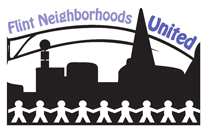By Coner Segren
At the most recent Flint Neighborhoods United monthly meeting, residents heard from Gary Jones, Flint community liaison for Gov. Gretchen Whitmer’s Office of Community Outreach, about the state’s lifting of pandemic restrictions. They also heard about a new federal program to allow for high-speed internet for communities lacking access and got tips from a local conservation group about how to control rodents.

“Flint Neighborhoods United (FNU) is a coalition of block club, neighborhood association and crime watch captains and presidents who come together on the first Saturday of each month to share information and leverage their resources to create positive change in the Greater Flint community. The group’s focus is from a city-wide perspective versus the focus of the individual members of a specific neighborhood or area within the city,” according to FNU’s website.
During the pandemic FNU has been holding its monthly meetings by Zoom session. Residents can join the meetings by going to the FNU website (www.flintneighborhoodsunited.org) to obtain the link. The meetings take place on the first Saturday of each month. There will be no FNU meeting in July. The next monthly meeting will be 9:30 a.m. Saturday, Aug. 7.
Gov. Gretchen Whtimer’s new plan lifts some pandemic restrictions

As more Michiganders get vaccinated, the Whitmer administration will be easing pandemic restrictions that have been in place for the past year. The Back to Normal Plan, released in April, outlines goals for the state to meet as it continues reopening.
According to Gary Jones, Flint community liaison for Whitmer’s Office of Community Outreach, the plan consists of two phases. The first began June 1, when outdoor capacity limits were lifted and limits for indoor gatherings increased to 50%.
People who are not vaccinated must continue to wear masks indoors. Curfews for restaurants and bars will remain in place through to at least the end of June, Jones emphasized.
Beginning in July, under the second phase of the plan, broad mask requirements and gathering limits will be lifted. From then on, the state government will monitor and may reinstate mitigation on an as-needed basis.
Jones also stated the state may impose targeted mitigation measures to protect vulnerable communities.
New Federal Program aims to reduce cost of high-speed Internet
A new federal program known as the Emergency Broadband Benefit (EBB) is making $3.2 billion available nationwide for communities with lack of access to high-speed internet. Qualifying households could receive up to $50 to help pay for internet access. For Tribal Lands, this benefit could extend to $75.
According to a May 12 press release from Gov. Whitmer’s office the EBB will also provide for a one-time device discount of up to $100 for a laptop or desktop computer or tablet purchased through an eligible provider. Consumers receiving the discount are required to make a co-payment of more than $10 and less than $50.
“With children learning online and parents working from home, the COVID-19 pandemic has highlighted just how great the need for reliable and affordable high-speed internet access is in Michigan, just as it is everywhere in our country.
“Internet service is no longer a luxury, it’s a necessity. I’m committed to making sure that we level the playing field so that everyone in our state has an equal opportunity to take advantage of online resources and participate fully in our society and economy,” according to Lt. Governor Garlin Gilchrist.
Lt. Gov. Garlin Gilchrist (at podium) and Gov. Gretchen Whitmer (in background). (Photo source: Gov. Whitmer’s office)
Some of the criteria for eligibility are as follows:
- Has an income that is at or below 135% of the Federal Poverty Guidelines or participates in certain assistance programs, such as SNAP, Medicaid or the FCC’s Lifeline program;
- Approved to receive benefits under the free and reduced-price school lunch program or the school breakfast program, including through the USDA Community Eligibility Provision, in the 2019-2020 or 2020-2021 school year;
- Received a Federal Pell Grant during the current award year;
- Experienced a substantial loss of income through job loss or furlough since February 29, 2020 and the household had a total income in 2020 at or below $99,000 for single filers and $198,000 for joint filers; or
- Meets the eligibility criteria for a participating provider’s existing low-income or COVID-19 program.
In addition to federal money, Gov. Whitmer has dispersed more than $20 million in Connecting Michigan Communities grants to approximately 12,000 homes and businesses. According to Gilchrist, the economic impact of these services is estimated to exceed $25 million.
Beginning May 12, 2021, eligible households can enroll in the Emergency Broadband Benefit program through a participating broadband provider or directly with the Universal Service Administrative Company (USAC) at getemergencybroadband.org. Mail-in applications will also be available. Additional information about the Emergency Broadband Benefit is available at fcc.gov/broadbandbenefit, or by calling 833-511-0311 between 9 a.m. and 9 p.m. any day of the week.
No Two Stripes Alike offers tips on animal control and conservation
With the arrival of summer, Flint residents are reporting upticks in encounters with animals such as deer and groundhogs. Shekinah Wagner Lee, a zoologist for the conservation group No Two Stripes Alike (N2SA), offered information about animal control services and tips for dealing with rodents and other animals.

Zoologist Shekinah Wagner Lee from the conservation group No 2 Stripes Alike (N2SA). (Photo source: Lee’s Facebook profile photo.)
According to Lee, one good way to keep rodents from invading your lawn is to use pellets or sprays to repel them. These can be found at any large chain store, such as Wal-Mart.
Another method for keeping unwanted animals out is by keeping yards free of woodpiles, overgrown bushes, or pet food. “If there is space for them to hide and run under, these are the yards they’re going to want to be in,” Lee said,
“So, anything that’s clean-cut or free of debris, they’re not going to want to stick around.” Odors from garbage cans, even ones that are empty, are also very attractive to animals and so N2SA recommends spraying down garbage cans or keeping them in the garage.
To frighten off unwanted creatures, Lee said the biggest deterrent is having a dog with free run of the yard. Lee also said that simple things like sprinklers and even small pinwheels that turn in the wind can be helpful.
“Absence of movement in a yard is a welcoming sign to them,” Lee said. “If you can have motion-activated sprinklers or motion-activated lights, all of these types of things keep these animals away, as well.”
EVM reporter Coner Segren can be reached at csegren@umich.edu.



You must be logged in to post a comment.